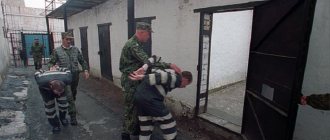Compulsory observation and treatment by a psychiatrist on an outpatient basis may be prescribed if there are grounds provided for in an article of this Code, if the person, due to his mental state, does not need to be placed in a medical organization providing psychiatric care in an inpatient setting.
- Article 99. Types of compulsory medical measures
- Article 101. Compulsory treatment in a medical organization providing psychiatric care in inpatient conditions
Second commentary to Art. 100 of the Criminal Code of the Russian Federation
1. Compulsory observation and treatment by a psychiatrist on an outpatient basis is prescribed:
1) persons who have committed a crime and suffer from mental disorders that do not exclude sanity;
2) those who, over the age of 18, have committed a crime against the sexual integrity of a minor under 14 years of age, and suffer from a disorder of sexual preference (pedophilia), which does not exclude sanity;
3) persons who have committed socially dangerous acts in a state of insanity.
This measure applies to persons who, due to their mental state, do not require placement in a medical organization providing psychiatric care in an inpatient setting and can comply with the treatment and observation regime. Their behavior is orderly, they are able to understand the significance of the medical measures applied to them.
2. When deciding on the appointment of this compulsory measure, the court takes into account:
1) the nature and degree of mental disorder;
2) the possibility of achieving the goals of using compulsory medical measures through compulsory observation and treatment by a psychiatrist on an outpatient basis;
3) the influence of a mental disorder on the patient’s behavior (aggressiveness, the presence of a real threat to himself and others, the likelihood of repeating a socially dangerous act, etc.).
According to the Law of the Russian Federation “On psychiatric care and guarantees of the rights of citizens during its provision,” dispensary observation can be established for a person suffering from a chronic and protracted mental disorder with severe, persistent or often exacerbating painful manifestations.
3. This compulsory measure presupposes: mandatory clinical observation, regular examinations by a psychiatrist, psychophysiological and other treatment, and implementation of rehabilitation measures.
4. Persons sentenced to imprisonment, forced labor or arrest shall undergo observation and treatment in accordance with Art. 18 of the Penal Code of the Russian Federation in institutions executing these types of punishments. According to the joint order of the Ministry of Health and Social Development of the Russian Federation and the Ministry of Justice of the Russian Federation dated October 17, 2005 No. 640/190 “On the procedure for organizing medical care for those serving sentences in prison and in custody,” this measure is implemented in institutions that have a doctor on staff. psychiatrist.
Persons sentenced to non-custodial sentences undergo compulsory observation or treatment by a psychiatrist in a medical institution at their place of residence. A court order on the application of such a measure is sent to the specified institution; this is also reported to the internal affairs body, whose task is to control and ensure the appearance of a person subjected to a compulsory measure of a medical nature to a psychiatrist at the frequency established by it.
5. In accordance with the Instruction “On the organization of interaction between healthcare authorities and internal affairs bodies of the Russian Federation to prevent socially dangerous actions of persons suffering from mental disorders,” approved by the joint order of the Ministry of Health of the Russian Federation and the Ministry of Internal Affairs of the Russian Federation dated April 30, 1997 No. 133/269, a medical institution, in particular, sends to the internal affairs body at the place of residence of persons with mental disorders who are undergoing outpatient compulsory observation and treatment, information about a change in place of residence, as well as in case of long-term absence from the place of registration. Having received information from the internal affairs body about the commission by a person suffering from a mental disorder of actions containing signs of a criminal act, an administrative offense, or about the appearance of behavioral characteristics in him that indicate a real possibility of committing socially dangerous actions, the medical institution decides on the advisability of immediate hospitalization.
How does the company establish the working regime for each employee?
As mentioned above, the company must establish the labor regime for each category of employees in a local regulatory document. In general, such a document is the internal labor regulations (Article 189 of the Labor Code of the Russian Federation).
For information on how such a document is drawn up, see the article “Internal Labor Regulations - Sample 2015”.
At the same time, a company can prescribe working time regulations in a collective agreement or in an employment contract with individual specialists. At the same time, it is important to understand that in the employment contract the company can either duplicate the regulations from the labor regulations or define a different labor regime applicable only to a given employee.
Third commentary to Article 100 of the Criminal Code of the Russian Federation
1. Outpatient compulsory observation and treatment by a psychiatrist belongs to the category of the least stringent types of compulsory medical measures. This type of compulsory treatment is prescribed in cases where a person, due to his mental state, does not need to be placed in a psychiatric hospital (Article 100 of the Criminal Code). Basically, outpatient compulsory observation and treatment by a psychiatrist is applied to persons who have committed a crime and suffer from mental disorders that do not exclude sanity. In this case, the court takes into account: the nature and degree of the person’s mental disorder, the social danger of the act, the real opportunity in a particular region to provide outpatient observation and treatment by a psychiatrist.
2. Outpatient psychiatric care provides for periodic health examination of persons in need of medical measures, diagnosis of mental disorders, their treatment, psychoprophylaxis and rehabilitation assistance, special care for persons suffering from mental disorders.
3. Outpatient observation and treatment by a psychiatrist, as a rule, is prescribed for those individuals who can realistically assess their mental state, voluntarily comply with the treatment regimen and means, have stable and predictable behavior, do not require constant medical supervision and have the ability to independently solve social problems. and everyday issues.
4. One of the most important components of outpatient compulsory observation and treatment by a psychiatrist is dispensary observation, which includes regular examinations by a psychiatrist. Moreover, such examinations do not necessarily require the consent of the patient or his relatives. Dispensary observation also involves the use of psychopharmacological, psychotherapeutic and social rehabilitation agents. At present, when the process of overcoming health crises is just beginning, it is difficult to count on the high effectiveness of outpatient compulsory observation and treatment by a psychiatrist. Nevertheless, there are incomparably more positive aspects here. Treatment of mental disorders in a familiar environment for the patient, and even more so the completion of treatment carried out in a hospital, is almost always more effective in an outpatient setting.
5. The implementation of outpatient compulsory observation and treatment by a psychiatrist for persons convicted of crimes committed in a state of sanity, but in need of treatment for mental disorders (Part 2 of Article 99 of the Criminal Code) is unique.
This uniqueness is determined mainly by the place of compulsory observation and treatment (correctional institution). In accordance with Art. 18 of the Criminal Code and Part 1 of Art. 104 of the Criminal Code, depending on the nature of the diseases and their course, compulsory medical measures for those sentenced to imprisonment are applied either in the medical-sanitary part of the correctional institution or in the correctional institution. As for those sentenced to other types of punishment (not related to imprisonment), compulsory medical measures are carried out in relation to them in health care institutions that provide outpatient psychiatric care. ‹ Article 99. Types of compulsory medical measuresUp Article 101. Compulsory treatment in a medical organization providing psychiatric care in an inpatient setting ›
What, according to Article 100 of the Labor Code of the Russian Federation, should provide for an employee’s working hours?
As follows from Art. 100 of the Labor Code of the Russian Federation, for each individual category of specialists (in relation to positions held, professions, etc.), the company must necessarily determine the labor regime.
PAY ATTENTION! The company should prescribe specific provisions regarding the labor regime in a local regulatory document or in a collective (labor) agreement.
But regardless of which document the organization decides to outline the working hours for employees, Art. 100 of the Labor Code of the Russian Federation establishes some general requirements for the content of such regulations. In particular, the labor regulations must define the following conditions:
- the length of the working week for specialists (for example, “five - two”, i.e. five working days, two days off, “six - one”, “two in two”, etc.); if the company decided to establish a part-time work week for some specialists, this also needs to be stated;
- for which employees (if necessary) an irregular work schedule should be established;
- how many hours should a standard working day (shift) be for individual groups of specialists;
- specific start and end times of the working day (shift);
- breaks from work for employees (their time limits);
- number of shifts per day (if the company has a shift work schedule).
In addition to the above, Art. 100 of the Labor Code of the Russian Federation stipulates that for some categories of workers other characteristics of the labor regime may be established. Such workers, in particular, are specialists in the field of transport, communications and others with a special nature of work. The features of the regime for them are determined by the Government of the Russian Federation.
Federal Law dated April 1, 2020 No. 100-FZ
RUSSIAN FEDERATION
THE FEDERAL LAW
On amendments to the Criminal Code of the Russian Federation and Articles 31 and 151 of the Criminal Procedure Code of the Russian Federation
Adopted by the State Duma on March 31, 2021
Approved by the Federation Council on March 31, 2021
Article 1
Introduce into the Criminal Code of the Russian Federation (Collected Legislation of the Russian Federation, 1996, No. 25, Art. 2954; 1998, No. 22, Art. 2332; No. 26, Art. 3012; 1999, No. 7, Art. 873; 2001, No. 26 , Art. 2587; 2002, No. 19, Art. 1793; No. 30, Art. 3020; 2003, No. 50, Art. 4848; 2004, No. 30, Art. 3091, 3092; 2006, No. 31, Art. 3452; 2007, No. 1, Art. 46; No. 21, Art. 2456; No. 31, Art. 4008; 2009, No. 1, Art. 29; No. 45, Art. 5263, 5265; No. 52, Art. 6453; 2010, No. 19, Art. 2289; No. 31, Art. 4166; No. 50, Art. 6610; 2011, No. 1, Art. 10; No. 11, Art. 1495; No. 30, Art. 4605; No. 50, Art. 7362 ; 2012, No. 53, Art. 7631; 2013, No. 27, Art. 3442, 3478; No. 30, Art. 4078; No. 44, Art. 5641; 2014, No. 19, Art. 2303, 2335; No. 30, Art. 4228, 4259; No. 48, Art. 6651; 2015, No. 27, Art. 3983; 2021, No. 1, Art. 61; No. 28, Art. 4559; 2021, No. 15, Art. 2135; 2021, No. 1 , Art. 29, 85; No. 18, Art. 2584; No. 27, Art. 3939, 3940; No. 31, Art. 4818; 2021, No. 14, Art. 1459) the following changes:
1) add Article 2071 with the following content:
“Article 2071. Public dissemination of knowingly false information about circumstances posing a threat to the life and safety of citizens
Public dissemination, under the guise of reliable messages, of knowingly false information about circumstances that pose a threat to the life and safety of citizens, and (or) about measures taken to ensure the safety of the population and territories, methods and methods of protection from these circumstances -
shall be punishable by a fine in the amount of three hundred thousand to seven hundred thousand rubles, or in the amount of the wages or other income of the convicted person for a period of one year to eighteen months, or by compulsory labor for a term of up to three hundred sixty hours, or by corrective labor for a term of up to one year, or by restriction freedom for up to three years.
Note. In this article, circumstances that pose a threat to the life and safety of citizens are recognized as natural and man-made emergencies, environmental emergencies, including epidemics, epizootics and other circumstances resulting from accidents, hazardous natural phenomena, catastrophes, natural and other disasters, resulting (may result) in human casualties, damage to human health and the environment, significant material losses and disruption of the living conditions of the population.”;
2) add Article 2072 with the following content:
“Article 2072. Public dissemination of knowingly false socially significant information, resulting in grave consequences
1. Public dissemination, under the guise of reliable messages, of knowingly false socially significant information, which through negligence resulted in harm to human health, -
shall be punishable by a fine in the amount of seven hundred thousand to one million five hundred thousand rubles, or in the amount of the wages or other income of the convicted person for a period of up to eighteen months, or by corrective labor for a term of up to one year, or by forced labor for a term of up to three years, or by imprisonment for a term of up to three years. the same period.
2. The same act, which through negligence entailed the death of a person or other grave consequences, -
shall be punishable by a fine in the amount of one million five hundred thousand to two million rubles, or in the amount of the wages or other income of the convicted person for a period of eighteen months to three years, or by corrective labor for a term of up to two years, or by forced labor for a term of up to five years, or imprisonment for the same period.";
3) Article 236 should be stated as follows:
“Article 236. Violation of sanitary and epidemiological rules
1. Violation of sanitary and epidemiological rules, which through negligence resulted in mass disease or poisoning of people or created the threat of such consequences, -
shall be punishable by a fine in the amount of five hundred thousand to seven hundred thousand rubles, or in the amount of the wages or other income of the convicted person for a period of one year to eighteen months, or by deprivation of the right to hold certain positions or engage in certain activities for a period of one to three years, or by restriction freedom for a term of up to two years, or forced labor for a term of up to two years, or imprisonment for the same term.
2. Violation of sanitary and epidemiological rules, resulting in the death of a person through negligence, -
shall be punishable by a fine in the amount of one million to two million rubles, or in the amount of the wages or other income of the convicted person for a period of one to three years, or by restriction of liberty for a term of two to four years, or by forced labor for a term of three to five years. , or imprisonment for the same period.
3. Violation of sanitary and epidemiological rules, resulting in the death of two or more persons through negligence, -
shall be punished by forced labor for a term of four to five years or imprisonment for a term of five to seven years.”
Article 2
Introduce into the Criminal Procedure Code of the Russian Federation (Collected Legislation of the Russian Federation, 2001, No. 52, Art. 4921; 2002, No. 22, Art. 2027; No. 30, Art. 3020, 3029; No. 44, Art. 4298; 2003, No. 27, Art. 2700, 2706; No. 50, Art. 4847; 2004, No. 27, Art. 2711; 2005, No. 1, Art. 13; No. 23, Art. 2200; 2006, No. 28, Art. 2975, 2976; No. 31, Art. 3452; 2007, No. 1, Art. 46; No. 24, Art. 2830, 2833; No. 49, Art. 6033; No. 50, Art. 6248; 2009, No. 1, Art. 29; No. 11, Art. 1267; No. 44, Art. 5170; No. 52, Art. 6422; 2010, No. 1, Art. 4; No. 15, Art. 1756; No. 19, Art. 2284; No. 21, Art. 2525 ; No. 27, Art. 3431; No. 30, Art. 3986; No. 31, Art. 4164, 4193; No. 49, Art. 6412; 2011, No. 1, Art. 16, 45; No. 15, Art. 2039; No. 23, Art. 3259; No. 30, Art. 4598, 4605; No. 45, Art. 6322, 6334; No. 48, Art. 6730; No. 50, Art. 7361, 7362; 2012, No. 10, Art. 1162, 1166 ; No. 24, Art. 3071; No. 30, Art. 4172; No. 31, Art. 4330, 4331; No. 47, Art. 6401; No. 49, Art. 6752; No. 53, Art. 7637; 2013, No. 26, Art. 3207; No. 27, Art. 3442, 3478; No. 30, Art. 4031, 4050, 4078; No. 44, Art. 5641; No. 51, Art. 6685; No. 52, Art. 6945; 2014, No. 6, Art. 556; No. 19, art. 2303, 2310, 2333, 2335; No. 23, art. 2927; No. 26, art. 3385; No. 30, art. 4219, 4259, 4278; No. 43, art. 5792; No. 48, art. 6651; 2015, No. 1, art. 81, 83, 85; No. 6, art. 885; No. 10, art. 1417; No. 21, art. 2981; No. 24, art. 3367; No. 29, art. 4354, 4391; 2021, No. 1, art. 61; No. 14, art. 1908; No. 18, art. 2515; No. 26, art. 3868; No. 27, art. 4256, 4257, 4258, 4262; No. 28, art. 4559; No. 48, art. 6732; No. 52, art. 7485; 2021, No. 15, Art. 2135; No. 24, art. 3484, 3489; No. 31, art. 4743, 4752, 4799; No. 52, art. 7935; 2021, No. 1, art. 51, 53, 85; No. 18, art. 2569, 2584; No. 27, art. 3940; No. 31, art. 4818; No. 42, art. 6375; No. 47, art. 7134; No. 53, art. 8435, 8446, 8456, 8459; 2021, No. 14, art. 1459; No. 30, art. 4108, 4111; No. 44, art. 6175; No. 52, art. 7818; 2020, No. 8, Art. 919) the following changes:
1) part one of Article 31 after the numbers “207,” add the words “2071, 2072 part one,”;
2) in part two of Article 151:
a) subparagraph “a” of paragraph 1 after the numbers “2055,” add the numbers “2071, 2072,”, after the numbers “2351,” add the words “236 part three,”;
b) paragraph 3 after the numbers “236” should be supplemented with the words “parts one and two.”
Article 3
This Federal Law comes into force on the date of its official publication.
President of the Russian Federation V. Putin
Moscow Kremlin
April 1, 2021
No. 100-FZ
Article 1
Introduce into the Criminal Code of the Russian Federation (Collected Legislation of the Russian Federation, 1996, No. 25, Art. 2954; 1998, No. 22, Art. 2332; No. 26, Art. 3012; 1999, No. 7, Art. 873; 2001, No. 26 , Art. 2587; 2002, N 19, Art. 1793; N 30, Art. 3020; 2003, N 50, Art. 4848; 2004, N 30, Art. 3091, 3092; 2006, N 31, Art. 3452; 2007, N 1, article 46; N 21, article 2456; N 31, article 4008; 2009, N 1, article 29; N 45, article 5263, 5265; N 52, article 6453; 2010, N 19, Art. 2289; N 31, Art. 4166; N 50, Art. 6610; 2011, N 1, Art. 10; N 11, Art. 1495; N 30, Art. 4605; N 50, Art. 7362 ; 2012, N 53, Art. 7631; 2013, N 27, Art. 3442, 3478; N 30, Art. 4078; N 44, Art. 5641; 2014, N 19, Art. 2303, 2335; N 30, Art. 4228, 4259; N 48, Art. 6651; 2015, N 27, Art. 3983; 2021, N 1, Art. 61; N 28, Art. 4559; 2021, N 15, Art. 2135; 2021, N 1 , Art. 29, 85; N 18, Art. 2584; N 27, Art. 3939, 3940; N 31, Art. 4818; 2021, N 14, Art. 1459) the following changes:
1) add Article 2071 with the following content:
“Article 207 1 . Public dissemination of deliberately false information about circumstances posing a threat to the life and safety of citizens
Public dissemination, under the guise of reliable messages, of knowingly false information about circumstances that pose a threat to the life and safety of citizens, and (or) about measures taken to ensure the safety of the population and territories, methods and methods of protection from these circumstances -
shall be punishable by a fine in the amount of three hundred thousand to seven hundred thousand rubles, or in the amount of the wages or other income of the convicted person for a period of one year to eighteen months, or by compulsory labor for a term of up to three hundred sixty hours, or by corrective labor for a term of up to one year, or by restriction freedom for up to three years.
Note. In this article, circumstances that pose a threat to the life and safety of citizens are recognized as natural and man-made emergencies, environmental emergencies, including epidemics, epizootics and other circumstances resulting from accidents, hazardous natural phenomena, catastrophes, natural and other disasters, resulting (may result) in human casualties, damage to human health and the environment, significant material losses and disruption of the living conditions of the population.”;
2) add Article 2072 with the following content:
“Article 207 2 . Public dissemination of deliberately false socially significant information, resulting in grave consequences
1. Public dissemination, under the guise of reliable messages, of knowingly false socially significant information, which through negligence resulted in harm to human health, -
shall be punishable by a fine in the amount of seven hundred thousand to one million five hundred thousand rubles, or in the amount of the wages or other income of the convicted person for a period of up to eighteen months, or by corrective labor for a term of up to one year, or by forced labor for a term of up to three years, or by imprisonment for a term of up to three years. the same period.
2. The same act, which through negligence entailed the death of a person or other grave consequences, -
shall be punishable by a fine in the amount of one million five hundred thousand to two million rubles, or in the amount of the wages or other income of the convicted person for a period of eighteen months to three years, or by corrective labor for a term of up to two years, or by forced labor for a term of up to five years, or imprisonment for the same period.";
3) Article 236 should be stated as follows:
“Article 236. Violation of sanitary and epidemiological rules
1. Violation of sanitary and epidemiological rules, which through negligence resulted in mass disease or poisoning of people or created the threat of such consequences, -
shall be punishable by a fine in the amount of five hundred thousand to seven hundred thousand rubles, or in the amount of the wages or other income of the convicted person for a period of one year to eighteen months, or by deprivation of the right to hold certain positions or engage in certain activities for a period of one to three years, or by restriction freedom for a term of up to two years, or forced labor for a term of up to two years, or imprisonment for the same term.
2. Violation of sanitary and epidemiological rules, resulting in the death of a person through negligence, -
shall be punishable by a fine in the amount of one million to two million rubles, or in the amount of the wages or other income of the convicted person for a period of one to three years, or by restriction of liberty for a term of two to four years, or by forced labor for a term of three to five years. , or imprisonment for the same period.
3. Violation of sanitary and epidemiological rules, resulting in the death of two or more persons through negligence, -
shall be punished by forced labor for a term of four to five years or imprisonment for a term of five to seven years.”
How can a specialist change the work schedule in which he works?
Often in practice, an employee who initially came to the company for one work schedule wants to switch to some other schedule. How can such a transition occur?
Art. 72 of the Labor Code of the Russian Federation says that the terms of an employment contract with a specialist can only be changed by mutual agreement of the parties. The procedure is as follows: the employee writes a statement in which he asks the company to change the work regime. After this, if the company does not object, an additional agreement is drawn up to the employment contract with the specialist.
PAY ATTENTION!
The company has the right to change the working hours unilaterally for all employees, but in practice this will require a lot of labor (by virtue of Article 74 of the Labor Code of the Russian Federation): you will have to justify the reason, make changes to local documents, notify each specialist (and if someone If one of them is against it, then find another vacancy for such an employee), etc. You can find more complete information on the topic in ConsultantPlus. Free trial access to the system for 2 days.
Article 2
Introduce into the Criminal Procedure Code of the Russian Federation (Collected Legislation of the Russian Federation, 2001, N 52, Art. 4921; 2002, N 22, Art. 2027; N 30, Art. 3020, 3029; N 44, Art. 4298; 2003, N 27, Art. 2700, 2706; N 50, Art. 4847; 2004, N 27, Art. 2711; 2005, N 1, Art. 13; N 23, Art. 2200; 2006, N 28, Art. 2975, 2976; N 31, Art. 3452; 2007, N 1, Art. 46; N 24, Art. 2830, 2833; N 49, Art. 6033; N 50, Art. 6248; 2009, N 1, Art. 29; N 11, Art. 1267; N 44, Art. 5170; N 52, Art. 6422; 2010, N 1, Art. 4; N 15, Art. 1756; N 19, Art. 2284; N 21, Art. 2525 ; N 27, Art. 3431; N 30, Art. 3986; N 31, Art. 4164, 4193; N 49, Art. 6412; 2011, N 1, Art. 16, 45; N 15, Art. 2039; N 23, Art. 3259; N 30, Art. 4598, 4605; N 45, Art. 6322, 6334; N 48, Art. 6730; N 50, Art. 7361, 7362; 2012, N 10, Art. 1162, 1166 ; N 24, Art. 3071; N 30, Art. 4172; N 31, Art. 4330, 4331; N 47, Art. 6401; N 49, Art. 6752; N 53, Art. 7637; 2013, N 26, Art. 3207; N 27, Art. 3442, 3478; N 30, Art. 4031, 4050, 4078; N 44, Art. 5641; N 51, Art. 6685; N 52, Art. 6945; 2014, N 6, Art. 556; N 19, art. 2303, 2310, 2333, 2335; N 23, Art. 2927; N 26, art. 3385; N 30, art. 4219, 4259, 4278; N 43, Art. 5792; N 48, art. 6651; 2015, N 1, art. 81, 83, 85; N 6, Art. 885; N 10, art. 1417; N 21, art. 2981; N 24, art. 3367; N 29, Art. 4354, 4391; 2021, N 1, Art. 61; N 14, Art. 1908; N 18, Art. 2515; N 26, Art. 3868; N 27, art. 4256, 4257, 4258, 4262; N 28, art. 4559; N 48, art. 6732; N 52, Art. 7485; 2021, N 15, Art. 2135; N 24, art. 3484, 3489; N 31, art. 4743, 4752, 4799; N 52, art. 7935; 2021, N 1, art. 51, 53, 85; N 18, art. 2569, 2584; N 27, art. 3940; N 31, art. 4818; N 42, art. 6375; N 47, art. 7134; N 53, Art. 8435, 8446, 8456, 8459; 2021, N 14, art. 1459; N 30, art. 4108, 4111; N 44, art. 6175; N 52, art. 7818; 2020, N 8, art. 919) the following changes:
1) part one of Article 31 after the numbers “207,” add the words “2071, 2072 part one,”;
2) in part two of Article 151:
a) subparagraph “a” of paragraph 1 after the numbers “2055,” add the numbers “2071, 2072,”, after the numbers “2351,” add the words “236 part three,”;
b) paragraph 3 after the numbers “236” should be supplemented with the words “parts one and two.”






